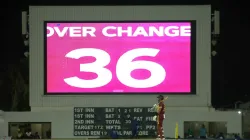ICC is set to ensure timely completion of matches in white-ball formats with the permanent implementation of stop clock rule. It is currently undergoing trial but will become a part of the rule book from the upcoming T20 World Cup in the West Indies and the USA in June 2024. The world cricketing body had introduced the rule on an experimental basis in December 2023 but will now be including in the stands playing conditions.
However, the rule necessitates the display of the electronic clock between overs for the fielding team to make the move.
What is the exact rule?
According to the rule, the fielding team is required to start the new over within 60 seconds after the previous over ends. The third umpire will switch on the timer as soon as the over is completed. The fielding team will get two warnings from the umpires for breaches before imposing the five-run penalty or every subsequent breach.
Meanwhile, the umpires will have the authority to decide whether the delays are caused by the batters, DRS calls or for any other reason. According to Cricbuzz, the decision to make the stop clock rule permanent was approved at the ICC meeting in Dubai.
A discussion is also expected to happen regarding the Champions Trophy with the main point being India's refusal to travel to Pakistan who are the designated hosts of the tournament. Last year, the Asia Cup was also scheduled to be played in Pakistan but the competition was eventually played in the hybrid model. Pakistan got to host only a few matches while the rest of the games were played in Sri Lanka. Coming back to stop clock rule, it will play a huge role in close encounters as matches can turn on its head if a penalty of five runs is imposed.
